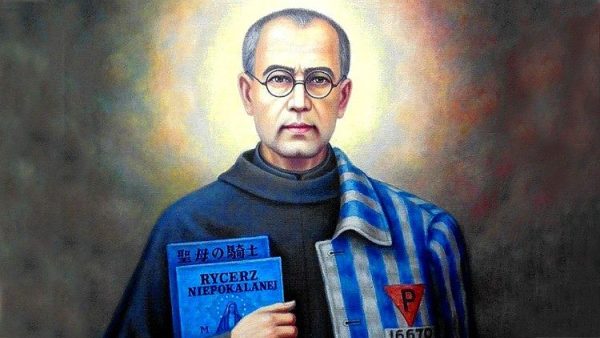St. Maximilian Kolbe: martyr of supreme sacrifice of life
 The Polish priest was killed by the Nazis with a lethal injection on August 14, 80 years ago. The Catholic Church declared Kolbe Blessed in 1971 and canonized him as a martyr in 1982.
The Polish priest was killed by the Nazis with a lethal injection on August 14, 80 years ago. The Catholic Church declared Kolbe Blessed in 1971 and canonized him as a martyr in 1982.
The Catholic Church on Saturday celebrated the feast of Polish martyr, St. Maximilian Kolbe. The 47-year-old Franciscan Conventual priest volunteered to die in place of a stranger 80 years ago on August 14, at the German Nazi concentration and death camp of Auschwitz in Poland.
St. Kolbe, the founder of the worldwide evangelization movement, Militia Immaculatae, and a missionary in Japan in the 1930s, faithfully followed the path of Christ’s sacrifice and His words in John’s Gospel: “No one has a greater love than this: to lay down one's life for one's friends”.
The priest was arrested in February 1941 on charges of aiding Jews and the Polish underground and was imprisoned in Warsaw. He was deported to the death camp of Auschwitz, Poland, where he was stripped of his Franciscan habit and assigned prisoner number 16670. He was forced to the most humiliating jobs, such as carrying dead bodies to the crematorium. Nevertheless, he continued his charity and priestly ministry, for which he was subjected to violent beatings by the guards.
A life donated
However, things took a dramatic turn at the end of July 1941, when a prisoner escaped from Auschwitz. In retaliation, the deputy camp commander picked up 10 men to be starved to death in an underground bunker to deter further escape attempts. When one of the selected men, Franciszek Gajowniczek, cried out, 'My wife! My children!', Kolbe volunteered to die in his place, arguing he was a Catholic priest and older than Gajowniczek, 41. The deputy commander accepted the offer.
St. Pope Paul VI, who described Kolbe as a 'martyr of love', said the priest offered his life in exchange for the life of a husband and father of 2 sons, who later recounted those dramatic moments. 'Kolbe left the ranks, risking being killed on the spot, to ask the camp leader to replace me,” Gajowniczek said. “It was not conceivable that the proposal would be accepted, indeed much more likely that the priest was added to the ten selected to die of hunger and thirst together,” he added.
'Starvation bunker'
The Polish priest and others were thus locked up in the 'starvation bunker' without food and water. According to an eyewitness, who was an assistant janitor at that time, Kolbe led the prisoners in prayer. Prison guards found him standing or kneeling in the cell and looking calmly at those who entered. After they had been starved and deprived of water for two weeks, only Kolbe remained alive.
The prison authorities who wanted the bunker emptied, made short work of Kolbe on August 14, 1941, with a lethal injection of carbolic acid. Kolbe is said to have raised his left arm and calmly waited for the injection. Before dying, he pronounced the two words, “Ave Maria”, the final pledge of a life entrusted to the Immaculate Conception. His remains were cremated on 15 August, the feast of the Assumption of Mary.
Saint and martyr
In his homily at the canonization Mass of Kolbe on October 10, 1982, St. John Paul II said, “Death suffered for love, in place of the brother is a heroic act of man, through which, together with the new Saint, we glorify God.” In fact, it is from God that the grace of such heroism and this martyrdom comes, he said.
During his general audience of August 13, 2008, Pope Benedict XVI recalled the words of Kolbe in the face of the fury and hatred of Nazi persecution: 'Hate is not a creative force: only love is'. The Pope explained love is precisely the distinctive trait, the imperishable legacy of the saint that the Church remembers on August 14, on the eve of the solemnity of the Assumption of the Blessed Virgin Mary.
During his visit to Poland in 2016, Pope Francis on July 29 visited the “starvation bunker” where Kolbe breathed his last in Auschwitz. After a moment of silence and reflection, he left, signing the visitors' book with a brief prayer: “Lord, have mercy on your people, Lord, forgive us for so much cruelty”.
Indian Cardinal Oswald Gracias of Bombay delivered a homily during an online Mass on Saturday. He briefly reflected on last years of St. Maximilian Kolbe.
Robin Gomes
Source: vaticannews.va
